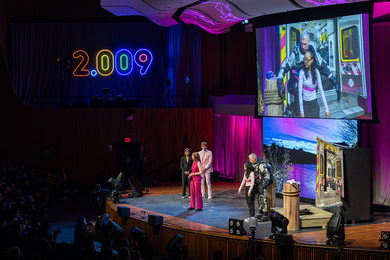Nationally, the Class of 2009 faced the worst job market in over a generation. Early in the year, the National Association of Colleges and Employers (NACE) reported employer projections for hiring graduating seniors fell by 21 percent from the previous year. The decline affected nearly all industries. Consequently, only 20 percent of graduating seniors had offers at the time of graduation. For those who did receive offers, the average salary fell by 1.2 percent to $48,633.
In contrast, 89 percent of graduating MIT seniors, who were pursuing work, had accepted a job offer by the time of graduation. The average starting salary rose to $67,270 which represents a 2.5 percent increase and continues a five-year upward trend [see figure 3]. While this is a significantly higher salary than the national average for all disciplines, it is also higher than the average starting salary for engineering graduates ($59,670) and finance graduates ($49,163). A large number of graduating seniors accepted offers in the finance and technology sectors.
The decline in college hiring was very evident at MIT. During the 2008-2009 recruiting season, which runs from September-March, the Global Education and Career Development Center (GECDC) experienced a 29 percent decrease in on-campus recruiting by employers. While this resulted in fewer job applications and fewer interviews than in previous years, on-campus recruiting continued as the primary source of employment [see figure 2]. At the same time, it is clear that MIT students were resourceful in this challenging job market. They continued to use networking as a key source of employment and relied more heavily on developing opportunities through internships, career fairs and contacts acquired through the GECDC [see figure 2]. The ultimate outcome was an increase in the average number of offers [see figure 3].
Several factors influenced the success of graduating seniors in finding lucrative employment:
There is no denying that the job search for the Class of 2009 was more challenging than recent years. In looking forward, there are some early signals that the economic downturn may be turning around. However, job creation is not immediately following. A recent NACE report noted that employers expect to hire 7 percent fewer graduates from the Class of 2010 than the previous year. In spite of continuing projected declines in college hiring, it appears that MIT graduates are well positioned to continue to beat the odds.
The details of the immediate post-graduation plans of graduating MIT students are gathered via the Graduating Student Survey. The results for the Class of 2009 Graduating Student Survey results will be posted on the GECDC website by early December.
Data cited from the National Association of College and Employers (NACE) can be found in the following press releases and underlying reports:
In contrast, 89 percent of graduating MIT seniors, who were pursuing work, had accepted a job offer by the time of graduation. The average starting salary rose to $67,270 which represents a 2.5 percent increase and continues a five-year upward trend [see figure 3]. While this is a significantly higher salary than the national average for all disciplines, it is also higher than the average starting salary for engineering graduates ($59,670) and finance graduates ($49,163). A large number of graduating seniors accepted offers in the finance and technology sectors.
The decline in college hiring was very evident at MIT. During the 2008-2009 recruiting season, which runs from September-March, the Global Education and Career Development Center (GECDC) experienced a 29 percent decrease in on-campus recruiting by employers. While this resulted in fewer job applications and fewer interviews than in previous years, on-campus recruiting continued as the primary source of employment [see figure 2]. At the same time, it is clear that MIT students were resourceful in this challenging job market. They continued to use networking as a key source of employment and relied more heavily on developing opportunities through internships, career fairs and contacts acquired through the GECDC [see figure 2]. The ultimate outcome was an increase in the average number of offers [see figure 3].
Several factors influenced the success of graduating seniors in finding lucrative employment:
- MIT students have strong analytical skills which are highly valued in many sectors including finance, technology, management consulting, and aerospace and defense.
- Employers continue to believe that hiring top talent directly from universities is an essential strategy for future growth and leadership.
- Nationally, engineers earn the highest starting salary and continue to see the largest increases in average salary.
- Students accepted offers from their internship employers more than ever before: 30.3 percent in 2009 and 28.3 percent in 2008.
- The GECDC developed a “Troubled Economy Series” featuring a series of workshops and panels to help students gain internships and employment. More than 100 students attended.
- The GECDC initiated two new career fairs. The Federal Agency Career Fair brought in 30 recruiting organizations and 375 students. The Spring Career Fair, held in April, had more than 45 companies and more than 600 students in attendance.
There is no denying that the job search for the Class of 2009 was more challenging than recent years. In looking forward, there are some early signals that the economic downturn may be turning around. However, job creation is not immediately following. A recent NACE report noted that employers expect to hire 7 percent fewer graduates from the Class of 2010 than the previous year. In spite of continuing projected declines in college hiring, it appears that MIT graduates are well positioned to continue to beat the odds.
The details of the immediate post-graduation plans of graduating MIT students are gathered via the Graduating Student Survey. The results for the Class of 2009 Graduating Student Survey results will be posted on the GECDC website by early December.
Data cited from the National Association of College and Employers (NACE) can be found in the following press releases and underlying reports:
- College Class of 2009 Sees Declines in Starting Salary Offers, September 8, 2009
- Hiring Down 7 Percent for College Class of 2010, September 16, 2009






